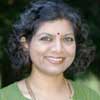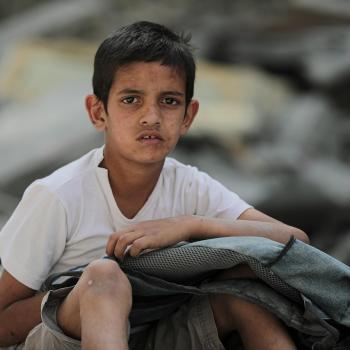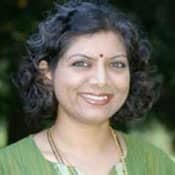 As we come upon Epiphany, I thought I would reflect on my Hindu-Christian Christmas experience at the end of a season. I was happy to see other Hindu American perspectives at the beginning of the season—by Aseem Shukla in A (Hindu) Christmas Carol?, and by Saumya Arya Haas in Holiday Giving's Not Just For Christians Anymore.
As we come upon Epiphany, I thought I would reflect on my Hindu-Christian Christmas experience at the end of a season. I was happy to see other Hindu American perspectives at the beginning of the season—by Aseem Shukla in A (Hindu) Christmas Carol?, and by Saumya Arya Haas in Holiday Giving's Not Just For Christians Anymore.
Many Hindus in America celebrate the Christmas season; my children go to school and hear about the family their classmates met over the holiday break, the gifts that they received, as I did decades ago. We imbibe the dominant culture's aspects, especially its celebrations. What probably makes my Christmas more interfaith than that of the typical pluralist Hindu is that my family and I attended services on Christmas Eve at St. Francis Episcopal Church in Stamford, CT.
In the early ‘70s, there were no Hindu temples in NY, so my parents taught me Hindu philosophy at home; we had an altar as most Hindu homes do. My parents reluctantly agreed to a Christmas tree (and the consumerism that went with it), but going to church at Christmas was not at all unusual; a group prayer experience fit within the pluralism that was taught at home. My parents created an extended family, which includes my uncle in Stamford; raised Catholic in southern India, he has been an integral part of my life since he and my father were grad students together. He must have remembered the time at St. James Catholic Church in Setauket where I unknowingly took communion at midnight mass as a 7- or 8-year-old. This Christmas Eve, he pointedly declared that "all are welcome to take communion at this service" just before we left for St. Francis.
We were a distinctly American family that came together at the service, various multilingual nuclear units knit together to celebrate the love we have for our common humanity. I was especially lucky getting to hold one of the twins celebrating his first Christmas. We sang: "O Come, All Ye Faithful," "Angels We Have Heard on High," "Hark the Herald Angels Sing." We prayed: the Celebrant said "The Lord be with you," our response, "And also with you." Later, the Leader said, "Give us grace to do your will in all that we undertake." And we responded, "That our works may find favor in your sight." And we listened: Rev. Mark Lingle's sermon on chaos and order, mentioning a memorial service he performed for a woman who wasn't formally religious, and how God's grace is for everyone; a bell choir playing "Little Drummer Boy." Songs of devotion, universal prayers of harmony, guiding words, and sonorous bells—the processional even included incense—these words describe Hindu worship as well. Then came the call to take communion.
My 12-year-old son, sitting in the row before me, didn't go up. He has been raised with regular congregational worship within a Hindu temple community, and looks forward to the blessed food—prasad, the food offered to the deity and then shared amongst worshippers. I whispered, "Go, it's okay, it's like prasad," encouraging him to partake, which he did. At the temple, we also invite visitors of all beliefs to partake of prasad, so I was surprised at his hesitation here. I wondered if it had anything to do his having a distinctly Hindu identity and taking communion as being something Christians do.
Maybe he will realize that being Hindu is appreciating and embracing all ways of belief, even as it makes you uncomfortable. Someday he will understand that life is a finding the universality in the diversity—Nirguna and Saguna Brahman, Dvaita and Advaita philosophy—as I did during the Christmas Eve service . . . with the exclusiveness of the Nicene Creed, read after the sermon ("We believe in one Lord, Jesus Christ, the only Son of God . . ."), and the inclusiveness of the prayer read later, at the Breaking of the Bread: "We break this bread for those who journey the way of Sikhs and Hindus, for those who follow the path of the Buddha, for our sisters and brothers of Islam, for the Jewish people from whom we come and for all who walk the way of faith. [Blessed be God forever.] We break this bread for the earth we have wasted, for those who have no bread, and for ourselves in our brokenness. [Blessed be God forever.]" Om Shanti Shanti Shanti.
1/6/2011 5:00:00 AM





